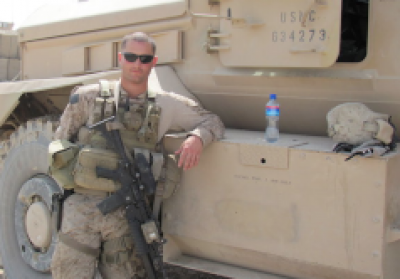
11 November 2014 3:01PM
When Duke alumnus Jordan Rahal joined the Marine Corps in 2008, he didn’t know it would ultimately lead him to an opportunity in finance. Armed with the tenacity and resolve of a Marine – not to mention the quantitative skills of an economist, Rahal was able to get his first crack at working New York City.
The Chicago native graduated from Duke University with his M.A. in economics earlier this year, and he currently works for Goldman Sachs. He continues to serve as a Company Commander in the Reserves.
Rahal had previously interned for the investment banking firm as part of the Goldman Sachs Veterans Integration Program (VIP) — an experience he highly recommends to other veterans looking for exposure and insight into the finance world and corporate culture. Applications for the 2015 VIP will be available starting this Veterans Day, Tuesday, Nov. 11, 2014.
Duke University and the Department of Economics honor the men and women who have served in the military. Check out our interview with the Marine who went from Afghanistan to Wall Street.
Marine Corps
I didn’t always know that I wanted to serve in the military, but I was always fascinated by military service. I’ve had grandfathers and great uncles who served in the Army, Navy, and Army Air Corps. The idea didn’t really crystallize until I was a senior at Denison University. I didn’t have a burning interest in the private sector; I was fascinated by the notion of not only taking part in a cause that was bigger than myself but also being a leader from day one. I figured it would be a formidable experience that I could take with me anywhere and hopefully build upon down the road.
I deployed to Afghanistan in 2010 as a part of a Marine Corps Transition Team. Our job was to embed with the Afghan Border Police, where we lived, ate, slept, trained, and conducted partnered operations with our Afghan counterparts for seven months. After returning stateside, I held the billets (what we call jobs in the military) of executive officer and later company commander, where I had 90 people under my charge, before transitioning to the Reserves while attending Duke.
Duke Economics
I had originally intended to pursue a Ph.D. in economics, and I thought the Duke master’s program was a great preparatory step in that enterprise. I chose Duke Economics because of its incredibly flexible and challenging program, as well as its sterling reputation. I also thought being part of a big school would be a ton of fun, and would offer an interesting contrast to the small liberal arts college I attended (Denison University) as an undergrad. I was right!
Duke has proven to be an exceptional place with exceptional people. I loved every second I was there, and my wife and I have fallen in love with the Raleigh-Durham area. It’s a wonderful community and I will always be proud to call myself a member of the Blue Devil community for the rest of my life.
My first year in the program I took courses to prepare me for a Ph.D in economics. When I decided to opt for the private sector, my course load became more applied: I took some finance courses, a managerial accounting course, time series econometrics, and I shot for the moon with Bayesian statistics. I wouldn’t recommend taking four courses in a semester when you are spending 20-plus hours a week looking for a job (or really under any other circumstance for that matter) — especially if one of them is Bayesian statistics!
In some ways, having a military background helped with my academic career. I didn’t mind working hard and I had a lot of confidence in myself going into the program. At the same time I had to adjust to a seriously quantitative academic workload, and since the Marine Corps isn’t exactly the most mathematically or academically inclined organization in the world, there were tradeoffs.
Goldman Sachs
I am with the Credit Risk Management and Advisory Department at Goldman Sachs. I cover funding (fixed income, securities lending, equity funding; all short-run duration risk transactions), regulatory capital, and reporting requirements for the firm. It is an area in finance that has grown significantly since the financial crisis of 2007-08.
Being versed in a little finance as well as statistics and probability has helped me conceptualize how we look at our risk management and exposure methodologies. Additionally, being comfortable with thinking about data sets and having an overall analytical mental framework have been helpful.
Advice for Vets Pursuing Postgraduate Education
A few things:
First, try to know what it is exactly that you want to do and have a back-up plan in case you change your preference or it doesn’t work out. I would say for those of us in the Veterans community this one might be the hardest because there is a lot of stuff out there that we haven’t had exposure to. You will get the most out of your graduate education if you know how it fits into what you want to do next because you will be able to utilize the incredible amount of resources there and invest your time wisely.
Second, reach out to other vets who have made the transition to grad school (and into the civilian world thereafter). I can’t stress this one enough, as that was very much a key to me being successful. That being said--don’t be afraid to talk to people who aren’t vets but have succeeded in your fields of interest. Building a network is very important, not only for finding jobs but also for finding people who can be supportive and offer you valuable advice, insight and mentorship throughout this time. I was fortunate to have a lot of them available at Duke.
Third, never give up.